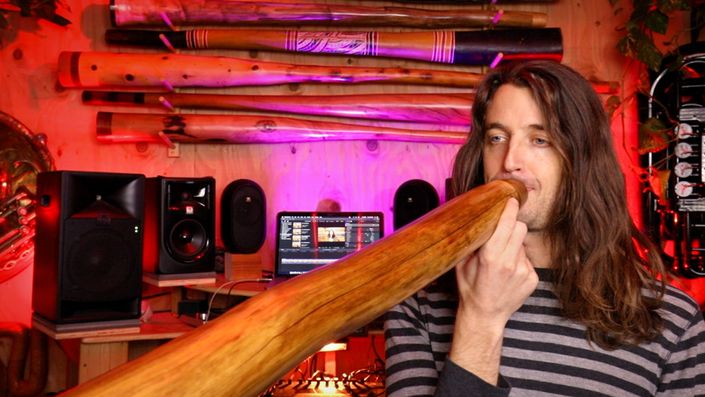Welcome to WET Didgeridoo Tutorials!
This website offers a new wave of videos that will make learning multidrone didgeridoo technique easier. These courses fill in crucial gaps of information that have been missing from my online content.
*I was going to wait to launch this site with several new courses at the same time. Due to the COVID-19 lockdown, I’ve decided to launch the first of the new courses (Foundational Multidrone Techniques) ahead of schedule. More courses are on they way!

Hi, I’m Will!
I am completely obsessed with the didgeridoo and any horn type instrument that can be played like one. I started playing when I was 11 years old, in Los Angeles, CA. Over the last 20 years, my obsession has taken me around the world, and I’ve been lucky to learn from a lot of incredible players.
I've learned a lot about learning and a lot about teaching this instrument. As a student, I am impatient, and very easily distracted. I really appreciate when people get to the core of a subject as quickly as possible. As a teacher, I try to boil down concepts as much as I can.
My journey has been focused on developing a unique style and exploring new ways of playing and crafting didgeridoos. I've become well known for developing a technique called multidrone. The lessons on this site will break down everything you need to know to incorporate this technique into your playing.
Thank you for checking out the course!

Music
I make up half of the funk/hip hop band Gorangutang with my music partner Tra’zae Clinton. Gorangutang combines rhythmic didgeridoo with a genre bending mix of contemporary sounds. My musical pursuits have fueled my crafting projects and exploration of new techniques.

Instruments
My Multidrone crafting brand is WET Didgeridoo
W.E.T is my initials; William Edwards Thoren. To learn more about my hand crafted instruments, music, and find a ton of information about multidrone, check out www.Wetdidgeridoo.com.

workshops
I’ve been teaching workshops and personal lessons on playing Multidrone technique for the past 10 years. In that time I have found teaching methods that make these techniques easy to achieve.
------------------------------
The didgeridoo originates from the Indigenous people of Australia. In the last 5 decades, it has spread around the world. In Australia, it has been used for thousands of years. I would not be the player I am today if I did not learn from and study traditional playing. Equally influential for me, was contemporary indigenous Australian playing.
I've tried to learn as much as I can about the didgeridoo's spread around the world, and the players who have amplified this. I would encourage anyone learning this instrument to research its origins as much as possible. Not everyone can afford to fly to Australia to learn about it first-hand. Fortunately, there are numerous websites and channels that have a ton of information and videos about traditional playing. Here are a few good places to start:
https://www.ididj.com.au/ ---- https://www.yyf.com.au/ ---- https://yidakistory.com/
Multidrone playing combines techniques from many other instruments and sources outside of didgeridoo. Didgeridoo was my first instrument, but it has led me to study the many large horns from cultures around the world. I would recommend studying the history and technical theories of brass instrument playing, specifically Tuba and Euphonium. Some of the techniques from the world of beatboxing can translate as well, such as the outward lip roll. Multidrone technique can be used and applied to all of these world instruments so long as they have a big enough mouthpiece to control their lowest playable range.

Rehearsing with William Barton
In 2007 I had a life changing trip to Australia. I got connected with William Barton, who is famous for playing the didgeridoo with orchestras around the world. He took me on the road with him for 6 weeks, and I learned a lot from him.

Making Yidaki with Djalu Gurruwiwi
After that tour, William Barton connected me with another didgeridoo legend, Djalu Gurruwiwi. Djalu is known as a custodian of yidaki (traditional word for didgeridoo) for the Gaalpu Clan. I got to spend 11 days with Djalu and his family, learning how they make Yidaki the traditional way.

Performing with William Barton
William gave me a taste of touring and performing with didgeridoo, and even let me play didge at one of his shows. I was exposed for the first time to the deep history of traditional playing. I got to hear an array of traditional and contemporary Australian players. I am forever grateful to everyone I met and learned from on that trip. I would not be the passionate musician I am today without this experience.



